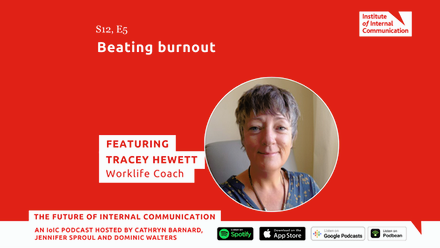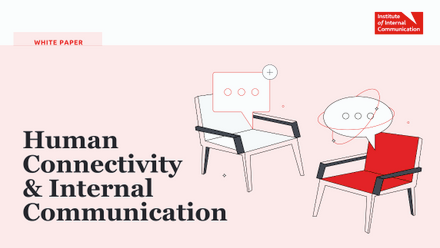In June, the IoIC published the second edition of its IC Index, produced in partnership with Ipsos Karian and Box. This important research explores the impact of internal communication on organisational performance and effectiveness.
This year, researchers surveyed 4,000 people working in the UK to expose headline insights for internal communicators. The data highlights the critical role of trust at work in boosting morale, motivation, engagement and results.
The findings of the IC Index underscore the crucial role of internal communication within organisations, not least as they attempt to navigate the continuous change that continues to define the tumultuous 2020s.

Amongst this year’s research highlights is the revelation that only 43% of respondents believe their organisation operates in the best interests of employees.
It’s widely felt that shareholders, profits and customers are prioritised over the interests of colleagues. The data also reveals that respondents feel their interests are of less importance to their employers than the interests of their senior leadership team.
Furthermore, a staggering 33% of respondents felt their CEO put their own interests above those of the wider organisation. And the larger the organisation, the more this sentiment prevails. Those working in organisations employing more than 10,000 people hold a particularly dim view.
Simply put, the research suggests colleagues feel their interests aren’t factored into organisational decision-making. This is worrying. Not least when the IC Index shows that colleagues who feel their employer DOES act in their interest have the highest average Trust Index score.
What’s the organisational cost of not prioritising colleagues’ interests and concerns?
What is the psychological toll of working for an employer that doesn’t prioritise the interests of its people? What impact does this have on morale, engagement, motivation, and – more importantly in the current economic climate – organisational performance?
As leaders struggle to navigate the convergent effects of multiple crises, can they really afford to have disengaged, apathetic co-workers?
Gallup’s 2024 State of the Global Workplace report reveals nearly one in five employees globally are ‘actively disengaged’ in their work. In parallel, it has found just over half of those surveyed are either keeping an eye out for, or proactively searching for, a new role.
It’s unsurprising so many people feel stressed at work. Geopolitical tensions show no sign of abating, the climate crisis is accelerating and there’s ongoing anxiety about the cost of living, the impact of AI on job stability and more. Gallup’s research shows 41% report feeling “a lot of stress” at work. Other workplace wellbeing research published in autumn 2023 shows one in four are at high-risk of work-related burnout.
Something, surely, has to give.
After 14 years of austerity and eight years of attempting to navigate the wider implications of Brexit, the UK can ill-afford to continue languishing at the bottom of the European league tables for colleague engagement. 2024 Gallup data shows the UK to sit in 33rd place out of 38.
What can internal communicators do?
Fortunately, these fresh IC Index insights present a significant opportunity for internal communication professionals to add strategic value, boost engagement and help improve organisational effectiveness. There are several immediate ways to do this.
1. The art of listening
To help colleagues feel their views, opinions and interests are being considered in wider organisational decision-making, they must first feel they are listened to.
Indeed, as the 2024 IC Index research shows, ‘listening to my views’ is one of the most highly valued attributes that survey respondents seek from their manager.
Employee voice has been cited by Engage for Success as one of four enablers. Building on vital research originally conducted in 2008/9, the all-volunteer movement has consistently extolled the power of internal conversations and colleague perspectives as central to organisational innovation and adaptation.
Feeling seen, heard and valued is a primary human motivator and internal communicators are expertly placed to help colleagues feel their perspectives are being acknowledged and considered by the wider organisation. As so many managers acknowledge needing help in better supporting their colleagues (74%, according to the IC Index), internal communication professionals are expertly placed to help line managers hone their listening skills.
2. Customise colleague experience
As we know, modern workforces are increasingly diverse in their attitudes, expectations and behaviours. It’s no longer viable to apply a ‘one-size-fits-all’ approach to internal communication. Different colleagues have different communication preferences and an internal communicator’s work is to identify the specifics of these preferences and customise the delivery of news and information in a way that suits each internal stakeholders’ needs.
As each set of preferences is identified, another opportunity presents – the opportunity to learn about the key issues that matter to each internal stakeholder.
For instance, the 2024 IC Index shows that 62% of the workforce expect their employer to take a proactive stance on societal issues, including the climate crisis and inequality. This is particularly important for those within the 25–34-year-old age bracket – a demographic that comprises both Gen Z and Millennials. Considering the increasing size – and influence – of this age demographic within the UK labour market today, can any organisation afford not to listen to – and integrate – such views? Employee activism is on the rise and all employers need a planned response.
3. Leverage plurality of perspective to boost organisational agility
Much has been written about the strategic value of harnessing diversity of thought. Most commercial challenges are now so thorny and complex, it’s increasingly impossible for an elite cohort of business strategists to have all the answers. Smart organisations are already devising ways to tap into the wider collective intelligence of their colleagues to problem-solve and adapt.
Internal communication has a crucial role to play in helping to build and nurture the relationships, strategic alignment and intra-team cohesion necessary to enhance this level of situational adaptation. With an applied focus on trust, as professionals, internal communicators can help colleagues become better connected to improve organisational agility.
Conclusion
Feeling seen and heard is an intrinsic human need that underpins long-term health and wellbeing. Feeling heard at work is an essential component of trust-building. Having a voice, feeling empowered to input into conversations that affect the future health and resilience of our organisations matters.
The alternative is widespread, latent apathy and the gradual erosion of the psychological factors that underpin long-term business sustainability.
For any organisation hoping to successfully navigate the uncharted territories of the 2020s, listening to – and integrating – the views and interests of increasingly diverse workforces is key. It allows better representation of alternative viewpoints into organisational decision-making, boosting the likelihood of successful market adaptation. And given what’s at stake, what organisation can afford not to do that?






